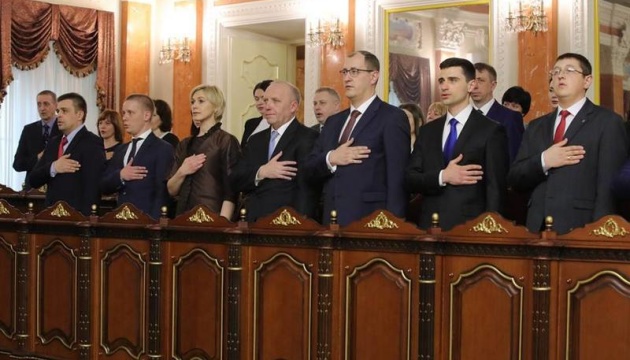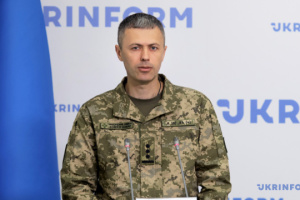
How judges of High Anti-Corruption Court were selected
Fighting corruption is a problem to which the whole Ukrainian society pays attention. Strong and effective action is expected of all anti-corruption bodies. At the same time, high hopes are pinned on the High Anti-Corruption Court, which has finally been formed. On April 11, judges of the High Anti-Corruption Court and the Appeals Chamber of the High Anti-Corruption Court took an oath at a ceremony with the participation of Ukrainian President Petro Poroshenko.
This was preceded by long and exhausting work that included legislative activity, the formation of the Public Council of International Experts and the competition itself. Chairman of the High Qualification Commission of Judges of Ukraine (HQCJ) Serhiy Koziakov stated repeatedly that the procedure had been politicized from the very beginning, but when they switched to competition procedures themselves, constructive and fruitful work with the participation of international experts began. Ukrinform prepared a brief summary of the chronology of events.
Actually, almost all politicians and most international experts spoke about the need to create an anti-corruption court, and they later watched the competition and commented on it more than once. Virtually all applications were approved.
"The meetings [of the HQCJ on the selection of judges] were public, and not just public – they were also broadcast on the Internet, that is, they were publicly available for absolutely everyone. Civil society was invited and involved. This is unique because no system in Europe provides for these additional steps for the involvement of civil society. And I would like to focus on this because it might be of interest to other countries as well. That is, this is a process that, in our opinion, works. And this is a process that can be introduced in other European systems - if they are brave enough to invite civil society to the judge selection process," said Georg Stava, director of the department of the Austrian Justice Ministry, expert of the EU Project "Pravo-Justice."
The launch of the High Anti-Corruption Court is one of the main requirements of the IMF to grant Ukraine another tranche of a loan. Those calling for this also include the EU, the United States, and the World Bank, which, like the IMF, tied financial assistance to Ukraine to the creation of an anti-corruption court.
WHAT IS WRITTEN IN THE LAW?
On July 7, the Verkhovna Rada of Ukraine adopted law No. 7440 on the High Anti-Corruption Court of Ukraine. Some 315 MPs voted for the document.
The law outlined the main "rules of the game" – a key role in the selection of anti-corruption judges was given to the High Qualification Commission of Judges of Ukraine under which the Public Council of International Experts (PCIE) was established. Six people were included in the PCIE. The PCIE and the HQCJ got the right to veto doubtful candidates for a judge's post.
COMPETITION: 343 CANDIDATES
On August 2, 2018, the HQCJ joined the process by announcing the competition for filling 39 vacant posts of judges of the High Anti-Corruption Court, including:
● 27 judges of the High Anti-Corruption Court;
● 12 judges of the Appeals Chamber of the High Anti-Corruption Court.
A total of 343 people (103 to the Appeals Chamber of the High Anti-Corruption Court and 240 to the High Anti-Corruption Court) applied for participation in the competition. Following a thorough examination of the documents submitted, 269 people were admitted to the competition and qualification assessment (88 to the Appeals Chamber of the High Anti-Corruption Court and 181 to the High Anti-Corruption Court).
The procedure was conducted similarly with the competition to the Supreme Court, which has already made a good showing on the international stage. The only difference was the introduction of open interviews during the second stage of the competition.
HOW THE PUBLIC COUNCIL OF INTERNATIONAL EXPERTS WAS FORMED
In July 2018, the High Qualification Commission of Judges of Ukraine (HQCJ) sent invitations to 15 international organizations with which Ukraine cooperates in the field of preventing and combating corruption regarding the provision of proposals on candidates for members of the PCIE.
On September 19, 2018, the HQCJ received information from five international organizations regarding 12 candidates for election to the PCIE. Candidates were recommended by the Council of Europe, the European Union, the European Anti-Fraud Office (OLAF), the European Bank for Reconstruction and Development (EBRD), and the Organization for Economic Cooperation and Development (OECD).
From October 18, 2018, to November 5, 2018, the HQCJ conducted Skype interviews with all 12 candidates.
On November 6, 2018, the HQCJ approved the decision to appoint six members of the PCIE: Aurelijus Gutauskas, Flemming Christian Denker, Ted Zarzeczny, Mirjana Lazarova Trajkovska, Lorna Harris, and Sir Anthony Hooper.
This was a new experience for the HQCJ, and everyone was expecting something unknown: how the process itself will last, legislation, methods of work used by elected members. Other important tasks were to be solved, including the provision of simultaneous interpretation. However, after all the tests, HQCJ Chairman Serhiy Koziakov repeatedly noted the diligence and professionalism of international experts.
The same opinion was shared by Sir Anthony Hooper, head of the PCIE: "This is the first time any country has ever invited a group of international experts to help in the appointment of judges. No other country has ever done this. [...] I think we were all in a state of not knowing. I don't think the High Qualification Commission probably really understood what difficulties and problems were ahead. [...] I have no doubt at all that this has been very successful and, as I have said many times, we in the PCIE have had the fullest cooperation from the High Qualification Commission."
FIRST STAGE: EXAMINATION. ANONYMOUS WRITING TESTING AND PRACTICAL TASK
Some 243 people participated in anonymous written tests at the examination stage during the qualification assessment as part of the competition.
According to the Commission's decision of November 13, 2018, 156 participants were allowed to fulfill the practical task.
By the way, PCIE members requested that the Commission provide all practical papers that the candidates for the Anti-Corruption Court had written. Without any hesitation, with the permission of the authors of the papers, the Commission handed over the papers to the PCIE.
The testing of personal moral and psychological qualities and general abilities of candidates for the Anti-Corruption Court was assigned later.
SPECIAL MEETINGS WITH PCIE'S PARTICIPATION
Prior to the next stage "Examining Dossiers and Holding Interviews," members of the PCIE and the HQCJ held six special joint meetings from January 18 to January 28, 2019. Such meetings were held for 49 candidates who raised questions from PCIE members.
Following the meetings, 39 candidates stopped their participation in the competition, seven candidates successfully passed the meetings and will take part in the next stage of qualification assessment – "Examining Dossiers and Holding Interviews," whereas three candidates wrote statements to stop their participation in the competition before special joint meetings.
Some 71 candidates were admitted to the next stage of qualification assessment "Examining Dossiers and Holding Interviews" as part of the competition for occupying vacant posts of judges to the High Anti-Corruption Court, including 19 to the Appeals Chamber of the High Anti-Corruption Court.
SECOND STAGE OF COMPETITION "EXAMINING DOSSIERS AND HOLDING INTERVIEWS"
The Commission, as part of the competition, defined the timetable for conducting interviews based on the results of the study of dossiers of candidates for filling vacant posts of judges to the High Anti-Corruption Court, in particular, the Appeals Chamber of the High Anti-Corruption Court, from January 30 to February 13, 2019.
On March 6, 2019, the HQCJ summed up the results of qualification assessment and approved the ratings of candidates for filling vacant posts of judges to the High Anti-Corruption Court and the Appeals Chamber of the High Anti-Corruption Court. The competition for these positions in the new court, which is being created as part of judicial reform, is one of the most transparent in the world in terms of public procedures.
The Public Council of International Experts played an important role during the competition held by the High Qualification Commission of Judges of Ukraine. In particular, according to the results of joint meetings, during which there were doubts regarding 49 candidates, 39 candidates stopped participating in the competition, seven successfully passed, and three applied for the termination of participation prior to joint meetings.
"Top-level professionals with the experience of work as judges and prosecutors in their countries helped the Commission determine the integrity and professionalism of candidates. Their decisive role in the process of qualification assessment of future judges of the High Anti-Corruption Court will be important in the future work of the new judicial body," Serhiy Koziakov said.
FINAL RATING
All candidates for the posts of judges of the High Anti-Corruption Court and its Appeals Chamber passed complex competitive tests in public. In particular, they took anonymous written tests on knowledge of the law, performed a practical task, passed psychological testing, their dossiers were analyzed by members of the HQCJ and the PCIE for integrity (morality, fairness, purity), as well as for the availability of knowledge and practical skills to consider relevant cases .
It is important that each stage of the competition was built to ensure maximum publicity of procedures for the public, which was noted by international experts.
"The final rating included the most worthy candidates who successfully passed all the stages of the competition and who raised no questions from the PCIE or they could explain them so convincingly that all questions were removed. This means that all the winners of the competition received the 'green light' from international experts who thoroughly checked the details of their biography, and Ukraine became the first country to invite international experts to judge selection," Vice-Chairman of the HQCJ Stanislav Shchotka said.
Moreover, Hooper sees his further role in the training of judges of the High Anti-Corruption Court.
"I am hoping to be involved with the training of the judges in the Anti-Corruption Court. Together with the World Bank, I have developed a course for judges and prosecutors. It is called 'Convicting the Corrupt and Confiscating Their Assets.' It's a four-day, very practical course, almost no lectures, just participants having to do practical work to understand the law relating to corruption and the law relating to proceeds from crime. And I would hope to give that course to the new judges of the High Anti-Corruption Court, and it's also important that judges of the Cassation Criminal Court who will hear appeals also attend the course. I have given this course in many countries and the last country I did it was in Kazakhstan," Sir Anthony Hooper said.
On March 18, the High Council of Justice (HCJ) decided to submit a motion to Ukrainian President Petro Poroshenko regarding the appointment to the High Anti-Corruption Court of 35 out of 39 judges who were recommended for appointment by the High Qualification Commission of Judges of Ukraine. On March 28, 2019, the HCJ decided to submit a motion to the president regarding the appointment of two more judges to the High Anti-Corruption Court and one to the Appeals Chamber of the same court.
At the same time, the HCJ left without consideration the recommendation of the High Qualification Commission of Judges of Ukraine about the appointment of Volodymyr Tsikalo as a judge of the Appeals Chamber of the High Anti-Corruption Court. Tsikalo withdrew his candidacy at a meeting of the High Council of Justice and withdrew his application for admission to the competition for the post of a judge of the Appeals Chamber of the High Anti-Corruption Court.
On April 11, judges of the High Anti-Corruption Court and the Appeals Chamber of the High Anti-Corruption Court took the oath at a ceremony with the participation of Ukrainian President Petro Poroshenko. "Thirty-eight new judges are beginning to fulfill their duties in a completely new court," the president said during the oath-taking ceremony.




